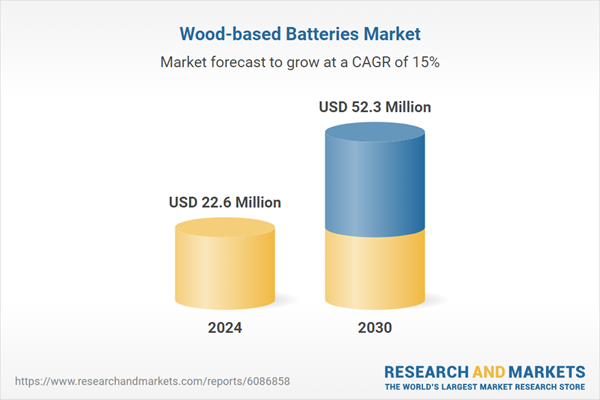Global Wood-Based Batteries Market - Key Trends & Drivers Summarized
Why Are Wood-Based Batteries Emerging as a Disruptive Force in Energy Storage?
Wood-based batteries are rapidly gaining attention as a promising alternative to conventional lithium-ion and metal-based battery technologies, primarily due to their sustainability, abundance of raw materials, and reduced environmental footprint. These next-generation batteries typically utilize lignin - a polymer found in plant cell walls and a by-product of the pulp and paper industry - as a carbon source for battery anodes, replacing traditionally mined and processed graphite. With the energy transition gaining momentum worldwide, there is growing pressure on the battery industry to develop greener, safer, and less resource-intensive solutions. Wood-based batteries align perfectly with this goal, offering not only biodegradability but also reduced dependence on critical raw materials like cobalt and nickel, which are often associated with geopolitical tensions and ethically questionable mining practices. Several research institutions and clean-tech startups in Scandinavia, Germany, and North America are leading innovations in this space, leveraging wood-derived nanocellulose and lignin carbon structures to enhance conductivity and stability. The potential to integrate these batteries into flexible, thin, and even transparent formats makes them suitable for a wide range of applications - from consumer electronics and wearable devices to large-scale grid storage. As climate policies tighten and supply chain sustainability becomes a competitive differentiator, wood-based batteries are poised to disrupt the global energy storage landscape.How Are Material Science Innovations Elevating the Viability of Wood-Based Batteries?
Recent breakthroughs in nanotechnology, bio-processing, and electrochemistry are significantly enhancing the performance and scalability of wood-based batteries. One of the core innovations involves the transformation of lignin into hard carbon via thermal processing, which produces a highly porous, conductive structure ideal for battery anodes. Compared to traditional graphite anodes, these lignin-derived carbon structures exhibit faster charge/discharge capabilities and improved lifecycle stability. Simultaneously, researchers are using nanocellulose derived from wood to develop solid-state electrolytes that are safer and more stable than liquid electrolytes, reducing the risk of thermal runaway and fire hazards. This not only improves the overall safety profile but also makes these batteries more suitable for wearable and implantable devices. Moreover, lignin's natural abundance and industrial by-product status ensure a steady, cost-effective supply chain with minimal additional environmental burden. Engineers are also experimenting with scalable manufacturing techniques such as roll-to-roll processing and additive printing to make the production of wood-based batteries compatible with existing battery assembly infrastructure. Laboratory trials and pilot-scale production have shown promising energy density levels, with continuous improvements driven by surface area optimization and doping of carbon structures with metals or conductive polymers. These scientific advancements are steadily moving wood-based batteries from experimental concepts to commercially viable energy solutions with clear ecological and performance benefits.How Are Industry Trends and Regulatory Pressures Shaping Market Adoption?
The wood-based batteries market is increasingly influenced by broader shifts in regulatory frameworks, investor sentiment, and corporate sustainability goals. Governments across Europe, North America, and Asia-Pacific are enacting stringent regulations aimed at decarbonizing the energy and transport sectors, including mandates for sustainable battery supply chains and recycling capabilities. In this context, wood-based batteries offer a low-impact, recyclable, and ethically sourced alternative that aligns with upcoming battery passport standards and carbon disclosure requirements. Major automotive and electronics manufacturers are under pressure to reduce their environmental footprint and diversify their battery sourcing strategies to mitigate risks associated with rare earth dependencies and volatile supply chains. These drivers are prompting collaborative efforts between battery startups and large industrial players in the forestry, paper, and energy sectors, aiming to create vertically integrated ecosystems where waste wood is converted into high-performance energy storage materials. Additionally, environmental, social, and governance (ESG) criteria are influencing capital allocation, with investors increasingly backing green battery technologies over traditional chemistries. On the consumer front, awareness about sustainability is fueling interest in environmentally friendly electronics, where wood-based batteries could become a compelling feature. Educational institutions and public-private partnerships are also playing a key role in accelerating research, patents, and pilot deployments, thereby nurturing the early-stage ecosystem and preparing the market for broader adoption.What Factors Are Driving the Accelerated Growth of the Wood-Based Batteries Market?
The growth in the wood-based batteries market is driven by several factors rooted in raw material sustainability, emerging application segments, and evolving energy strategies. A primary driver is the growing availability of lignin and nanocellulose as industrial by-products from the forestry and paper industries, offering a renewable and cost-efficient resource base for battery production. Another significant factor is the increasing demand for eco-friendly and safe batteries in consumer electronics, wearables, and medical devices - segments that are sensitive to size, heat, and environmental impact. As electric mobility diversifies beyond cars into e-bikes, drones, and urban micro-mobility solutions, there is rising interest in alternative chemistries that are lighter, safer, and more sustainable than lithium-ion. Additionally, the expanding global focus on decentralization and democratization of energy - through microgrids, home storage, and off-grid renewable systems - is creating opportunities for locally sourced, low-impact batteries that can be manufactured without intensive mining or chemical processing. Technological maturity is another key driver: pilot projects have already demonstrated promising performance metrics such as competitive energy density, long cycle life, and low-temperature operability, leading to growing confidence among investors and early adopters. Finally, global ESG imperatives and regulatory roadmaps - including the European Union's Battery Regulation and the U.S. Inflation Reduction Act - are actively incentivizing green innovation in battery materials, placing wood-based technologies on a strong growth trajectory within the evolving clean energy economy.Report Scope
The report analyzes the Wood-based Batteries market, presented in terms of market value (US$). The analysis covers the key segments and geographic regions outlined below:- Segments: Type (Rechargeable Wood-based Batteries, Non-rechargeable Wood-based Batteries); Capacity (Belwo 10 Ah Capacity, 10 - 50 Ah Capacity, 50 - 100 Ah Capacity, Above 100 Ah Capacity); Application (Laptops Application, Cell Phones Application, Hybrid & Electric Vehicles Application, Energy Storage Systems Application, Battery-operated Power Tools Application, Drones & Robotics Application, Power Electronic Devices Application, Electric Grids Application, Other Applications); End-Use (Automotive End-Use, Defense End-Use, Medical End-Use, Power End-Use, Consumer Electronics End-Use, Other End-Uses).
- Geographic Regions/Countries: World; United States; Canada; Japan; China; Europe (France; Germany; Italy; United Kingdom; Spain; Russia; and Rest of Europe); Asia-Pacific (Australia; India; South Korea; and Rest of Asia-Pacific); Latin America (Argentina; Brazil; Mexico; and Rest of Latin America); Middle East (Iran; Israel; Saudi Arabia; United Arab Emirates; and Rest of Middle East); and Africa.
Key Insights:
- Market Growth: Understand the significant growth trajectory of the Rechargeable Batteries segment, which is expected to reach US$30.5 Million by 2030 with a CAGR of a 13.2%. The Non-rechargeable Batteries segment is also set to grow at 17.9% CAGR over the analysis period.
- Regional Analysis: Gain insights into the U.S. market, valued at $6.2 Million in 2024, and China, forecasted to grow at an impressive 19.6% CAGR to reach $11.1 Million by 2030. Discover growth trends in other key regions, including Japan, Canada, Germany, and the Asia-Pacific.
Why You Should Buy This Report:
- Detailed Market Analysis: Access a thorough analysis of the Global Wood-based Batteries Market, covering all major geographic regions and market segments.
- Competitive Insights: Get an overview of the competitive landscape, including the market presence of major players across different geographies.
- Future Trends and Drivers: Understand the key trends and drivers shaping the future of the Global Wood-based Batteries Market.
- Actionable Insights: Benefit from actionable insights that can help you identify new revenue opportunities and make strategic business decisions.
Key Questions Answered:
- How is the Global Wood-based Batteries Market expected to evolve by 2030?
- What are the main drivers and restraints affecting the market?
- Which market segments will grow the most over the forecast period?
- How will market shares for different regions and segments change by 2030?
- Who are the leading players in the market, and what are their prospects?
Report Features:
- Comprehensive Market Data: Independent analysis of annual sales and market forecasts in US$ Million from 2024 to 2030.
- In-Depth Regional Analysis: Detailed insights into key markets, including the U.S., China, Japan, Canada, Europe, Asia-Pacific, Latin America, Middle East, and Africa.
- Company Profiles: Coverage of players such as Aero Assemblies, Inc., Alps Wire Rope, Asahi Ropes, Bekaert, Bergen Cable Technology, Inc. and more.
- Complimentary Updates: Receive free report updates for one year to keep you informed of the latest market developments.
Some of the 48 companies featured in this Wood-based Batteries market report include:
- Altris AB
- Bright Day Graphene
- CarbonScape
- Domsjö Fabriker
- Epishine AB
- Ligna Energy AB
- Linköping University
- Northvolt AB
- NovaCarbon Inc.
- OrganoClick AB
- Paper Battery Company
- RenFuel AB
- Stora Enso Oyj
- Sveaskog AB
- Svenska Cellulosa AB (SCA)
- UPM-Kymmene Corporation
- Valmet Oyj
- VTT Technical Research Centre of Finland
- Woodoo SAS
- Xylowatt SA
This edition integrates the latest global trade and economic shifts into comprehensive market analysis. Key updates include:
- Tariff and Trade Impact: Insights into global tariff negotiations across 180+ countries, with analysis of supply chain turbulence, sourcing disruptions, and geographic realignment. Special focus on 2025 as a pivotal year for trade tensions, including updated perspectives on the Trump-era tariffs.
- Adjusted Forecasts and Analytics: Revised global and regional market forecasts through 2030, incorporating tariff effects, economic uncertainty, and structural changes in globalization. Includes historical analysis from 2015 to 2023.
- Strategic Market Dynamics: Evaluation of revised market prospects, regional outlooks, and key economic indicators such as population and urbanization trends.
- Innovation & Technology Trends: Latest developments in product and process innovation, emerging technologies, and key industry drivers shaping the competitive landscape.
- Competitive Intelligence: Updated global market share estimates for 2025, competitive positioning of major players (Strong/Active/Niche/Trivial), and refined focus on leading global brands and core players.
- Expert Insight & Commentary: Strategic analysis from economists, trade experts, and domain specialists to contextualize market shifts and identify emerging opportunities.
Table of Contents
Companies Mentioned (Partial List)
A selection of companies mentioned in this report includes, but is not limited to:
- Altris AB
- Bright Day Graphene
- CarbonScape
- Domsjö Fabriker
- Epishine AB
- Ligna Energy AB
- Linköping University
- Northvolt AB
- NovaCarbon Inc.
- OrganoClick AB
- Paper Battery Company
- RenFuel AB
- Stora Enso Oyj
- Sveaskog AB
- Svenska Cellulosa AB (SCA)
- UPM-Kymmene Corporation
- Valmet Oyj
- VTT Technical Research Centre of Finland
- Woodoo SAS
- Xylowatt SA
Table Information
| Report Attribute | Details |
|---|---|
| No. of Pages | 504 |
| Published | February 2026 |
| Forecast Period | 2024 - 2030 |
| Estimated Market Value ( USD | $ 22.6 Million |
| Forecasted Market Value ( USD | $ 52.3 Million |
| Compound Annual Growth Rate | 15.0% |
| Regions Covered | Global |









